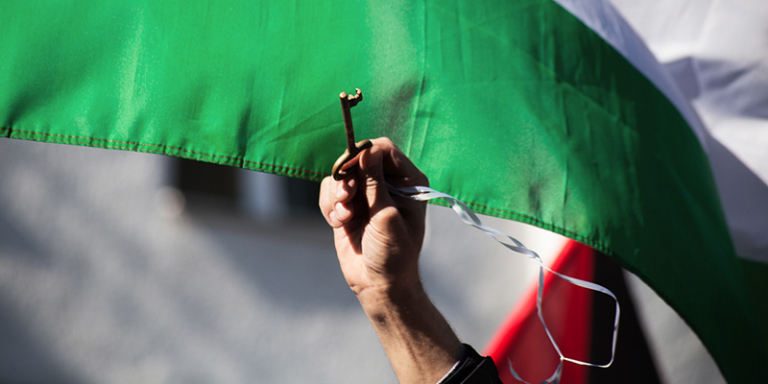
On the 73rd anniversary of the Palestinian Nakba, another round of dispossession of Palestinians continues, this time in Jerusalem’s Sheikh Jarrah neighborhood. Palestinian families are being forcibly expelled to make room for Jewish settlers who claim possession of homes in the area. The situation has sparked widespread Palestinian protests in the city and across the green line in Israel that are being met with brutal force. The Israeli police has repeatedly attacked worshippers in the Al-Aqsa Mosque during the Islamic holy month of Ramadan, causing hundreds of injuries among Palestinians. In Israel, Palestinian citizens organized their own protests against the expulsions. One Palestinian in Lydda was killed and many were injured in clashes with Jewish extremists and the police. In solidarity with Jerusalem Palestinians, and especially in response to Israeli actions, Hamas and armed factions in the Gaza Strip launched rockets on southern Israel, killing and injuring civilians. Israel mobilized reserve forces and retaliated with air strikes, killing scores of Palestinians, including children. Israeli Prime Minister Benjamin Netanyahu has declared a state of emergency.
To shed light on the issue, Arab Center Washington DC (ACW) asked some of its fellows and affiliates to contribute their reflections on different aspects of the Jerusalem events. Their responses are below.
What Makes Events in Sheikh Jarrah Unique?
Khalil E. Jahshan, ACW Executive Director
Since its inception in 1948 as a settler colonialist regime, Israel has been engaged in the dispossession of the Palestinian people. The occupation in June 1967 of Gaza and the West Bank, including East Jerusalem, followed the same pattern by adding another category of refugees deprived of their homes and properties. The ordeal of the latest flare-up in Sheikh Jarrah is unique for various reasons. First and foremost, it occurred at a time when Israeli politics were moving dramatically to the right, allowing the pro-settler lobby in Israel to effectively assume a partnership role in the current governing coalition (and probably the next). Practically speaking, this rendered Israel’s settlement policies significantly more aggressive and forceful in confiscating additional Palestinian land and depriving more Palestinians of their long-held family residencies, like the families of Sheikh Jarrah.
Second is the continuing governance crisis in Palestine, where after 27 years of existence, the Palestinian National Authority (PA) has failed dismally in effecting meaningful change in the quality of life in Palestine. It has also failed to bring its constituents even one iota closer to freedom and actual independence. The recent inability of the PA to conduct a widely popular parliamentary election for the first time in 15 years undoubtedly deepened public frustration, particularly in East Jerusalem and its suburbs, where a process of economic and social ghettoization has been unfolding due to Israel’s creeping annexation in addition to PA neglect, whether purposeful or not.
The third unique component of the Sheikh Jarrah case is its unifying impact on Palestinians. Simply put, it quickly captured the imagination of most Palestinians regardless of the geographic or sociopolitical divisions separating them. What has been deemed a local Jerusalemite cause for more than 53 years, since the 1967 war, suddenly became a spontaneous national outcry for the 13 million Palestinians worldwide.
Finally, there is the surprising impact of events in Sheikh Jarrah on the Palestinians inside Israel. These are citizens of the State of Israel who were still adjusting to the results of the March 23rd legislative election, broadly deemed as the most racist in Israeli electoral history. The violent attempts by the Israeli government to deal with the political problems in East Jerusalem clearly antagonized the already agitated Arab population in Israel, who sympathized with their fellow Palestinians facing confiscation of their homes and lands in the Sheikh Jarrah neighborhood. Moreover, the magnitude and intensity of the reaction this time in such places as Umm al-Fahm, Haifa, Acre, Nazareth, Ramla, Lydda, and others surprised all observers.
Palestine’s New Generation of Activists
Yara M. Asi, ACW Non-resident Fellow
There are a few lessons that it seems every Palestinian child is taught: how to pick the pebbles out of lentils and grains; how to remain calm when approached by an Israeli soldier; how to properly barter at the souk; and how to prepare his or her paperwork when approaching a checkpoint or border crossing. Another lesson taught was about separation: Palestinians from their land, of course, but, just as painfully, from each other. This separation is not accidental. Keeping Palestinians dispersed in their struggles prevents them from coalescing around their national struggle for liberation, decolonization, and human rights.
Therefore this past week, while feeling heartsick about seeing East Jerusalem burning, Palestinians displayed feelings of solidarity and shared struggle. People hiked from areas of the West Bank to East Jerusalem to show their support for the homeland and participated in protests and demonstrations throughout the Palestinian or mixed cities in Israel—Haifa, Jaffa, Nazareth, Lydda—for the first time in decades. Of course, brothers and sisters in besieged Gaza have been holding the Great March of Return for years. Rather than the well-known green flags of Hamas or the bright yellow flags of Fatah, most of the demonstrations featured one flag prominently: that of Palestine.
These protests are not about the quest for a state. And the lesson from this week is that this is the future of the Palestinian people. The youth, most of whom have never been able to vote or to experience any meaningful political participation in their lives, do not feel the burden of fear or expectation that their parents’ and grandparents’ generations felt. This generation has cameras, hashtags, and global solidarity. It is not invested in the idea of borders as much as in equality. This generation recognizes, perhaps more so than any other population on Earth, that solidarity against oppression is all there is. Seeing such solidarity turned inward is probably the only positive outcome of this entire miserable week, the last week of Ramadan, typically one of joyous gathering. This generation of young Palestinians has learned all too well that depending on the good will of the international community to bring them solutions is signing up for a lifetime of waiting, and they are tired of it. One state, two states—that is no longer the issue. The answer they seek is to this question: When will we gain equality with the people with whom we are sharing this land?
Arab Normalization with Israel Has Not Brought Peace
Radwan Ziadeh, ACW Senior Fellow
The history of normalizing Arab relations with Israel does not promise to advance the cause of a just and comprehensive peace between Israel and the Palestinians. Peace treaties between Israel and Egypt and Jordan in 1979 and 1994, respectively, have only produced diplomatic relations with a cold peace that has yet to become permanent and popular. A major factor in this is the general antipathy among the Egyptian, Jordanian, and Arab publics to Israel as well as their rejection of recognizing it before a just and equitable peace deal can be reached that would secure Palestinian national rights.
What is also complicating a peace deal is the radical transformation in Israeli politics and society. A right-wing movement seems to have overtaken politics in Israel, influencing any talk of compromise. The last four parliamentary elections attest to this transformation whereby rightist forces have succeeded in gaining majorities that reject the idea of an independent Palestinian state or even the prospect of limited concessions. These right-wing majorities have also pushed for additional annexation of occupied Palestinian land and more settlement in the West Bank and Jerusalem at the expense of the Palestinians and their rights.
This transformation in Israeli society following the assassination of Prime Minister Yitzhak Rabin in 1995 has effectively done away with the theory that normalizing with Arab countries will help to convince Israelis of the benefits of peace. This is a main reason for believing that last year’s normalization agreements between Israel and the United Arab Emirates, Bahrain, Sudan, and Morocco will not result in any discernible change in Israeli society toward allowing the compromise necessary to achieve peace. Perhaps what remains viable under current conditions is a committed return to the 2002 Arab Peace Initiative, which conditions Arab normalization with Israel on the latter’s acceptance of the establishment of a Palestinian state with Jerusalem as its capital and Israel’s return of occupied Arab land, such as the Golan Heights. Any normalization efforts short of those goals will remain mere trade agreements that do not lead to any real or sustainable peace.
The Tepid American Response to the Jerusalem Events Exposes Contradictions in US Foreign Policy
Sarah Leah Whitson, Executive Director, Democracy for the Arab World Now (DAWN)
On the eve of the Muslim Eid al-Fitr, Israelis and Palestinians are engulfed in the scenes of a recurring nightmare: young Palestinian protesters defying Israeli security forces against naked ethnic cleansing and home evictions in Jerusalem; armed groups in Gaza firing rockets on Israeli civilians; and Israeli airstrikes on Gaza. As of this writing, 7 have been killed in Israel. One hundred and nineteen Palestinians, including 31 children and 19 women, have been killed while some 830 others have been injured in Gaza. President Biden hoped very much to revert to a pre-Trump status quo of permanent occupation; guaranteed billions in unconditional support for the Israeli government; and a pretend peace process. Biden even pushed for a new little rigged election for the Palestinian Authority. But Palestinians enduring the bitter lived reality on the ground are having none of it. In the current conflagration between Israel and the Gaza Strip, Biden reverted to repeating the former’s right of self-defense, without a word about the Palestinians’ right to same.
The Biden Administration faces an impossible quandary, at once wanting to position itself, in contrast to Trump’s presidency, as a human rights-respecting government while maintaining its unquestioned devotion to Israel, no matter how egregious its abuses and racist its policies. On the heels of Human Rights Watch’s irrefutable determination that the Israeli authorities are committing the crime against humanity of apartheid, and the Carnegie Endowment for International Peace urging an equality and rights-based approach as the only viable approach to resolving the long-standing conflict, the quandary is even harder to bear, and no amount of chanting the “two-state solution” mantra will save it. The inescapable reality is that American military and political support is unjustifiably aiding and abetting the Israeli government and its worst abuses. The only way to disentangle the United States from Israeli abuses, and the irreparable harm to US interests and standing they cause, is to end our military and political support of this government.
Will the International Community Change Its Approach to Palestinian Rights?
Imad K. Harb, ACW Director of Research and Analysis
International solidarity with and advocacy for the rights of the Palestinian people have remained steady for decades and, indeed, gradually increased lately as Israeli policies became more extreme and exclusionary. The international community considers Palestinian rights protected by international law that is enshrined in conventions, pacts, and treaties. But the unfortunate fact is that this law has so far been toothless in defending Palestinian rights against Israeli encroachments. Israel has maintained its occupation of Palestinian land since 1967, imposed a criminal siege on the Gaza Strip since 2007, settled hundreds of thousands of Israelis in the West Bank and Jerusalem, and is now trying to expel East Jerusalemites from their homes. The United Nations cannot even defend the principle of Jerusalem as an open city whose fate will be decided in final status negotiations between Palestinians and Israelis. Instead, East Jerusalem—which the Palestinians have always wanted as a capital for a future independent state—is slowly being Judaized to eradicate all connection it might have to them and to their national identity.
What Palestinians ask—indeed, demand—of the international community is a clear, unambiguous, and committed stand on their right to Jerusalem and to an independent state that is backed up by actionable plans to put a check on Israeli practices. Currently, the most effective tool to influence Israeli action is to support the Boycott, Divestment, and Sanctions (BDS) movement. Whatever the response may be to the current situation, one thing should be clear: powerful international actors like the United States can no longer remain silent on Israeli violations of Palestinian rights. To be sure, the United States, in particular, has become a participant in these violations because of its commitment to Israel’s security, its billions of dollars in annual assistance, and its unwavering defense of Israeli interests in international forums. If Washington wants to be seen as a defender of human rights around the world, it cannot continue to ignore Israel’s daily violations of them. The same applies to other international actors.
No international order can be protected, sustained, or augmented if the rights of the weak are trampled by the whims, designs, or agendas of the powerful. Israel is committing grievous abuses against the Palestinians in Jerusalem, Gaza, and the occupied West Bank. it is high time the international community put teeth in its vaunted rules of legal and approved conduct to hold Israel accountable.





